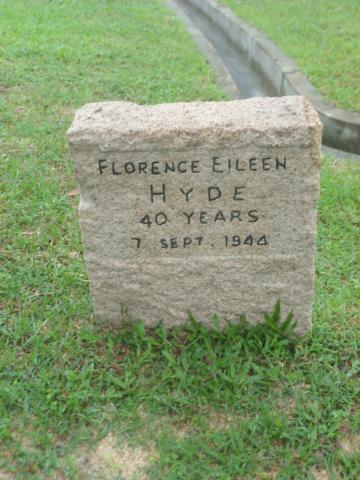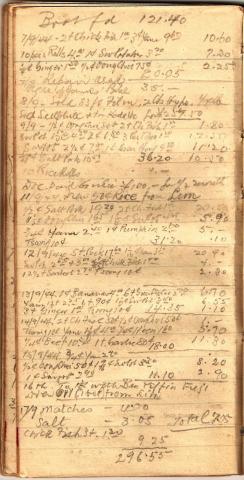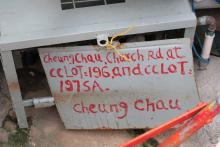70 years ago: Hong Kong's wartime diaries
7 Sep 1944, Barbara Anslow's diary
Submitted by Admin on Mon, 2012-04-16 17:28Book / Document:Date(s) of events described:Thu, 7 Sep 1944Mrs F. E. Hyde died (cancer) leaving Michael aged 6. Her husband was among those executed in October 1943. Lady M. Grayburn is looking after Michael, her husband died in Stanley Gaol in May 1943.
Veronica Ann Reddish born.
7 Sep 1944, Chronology of Events Related to Stanley Civilian Internment Camp
Submitted by brian edgar on Mon, 2012-07-23 00:20Book / Document:Date(s) of events described:Thu, 7 Sep 1944Florence Eileen Hyde dies of cancer. More than one internee believes that her tragic death is in part due to her husband's execution on October 29, 1943. Her young son, Michael, is adopted by Lady Vandeleur Grayburn so continues to live in Bungalow 'D'.
Birth of Veronica Ann Reddish.
Cecil Reddish is a police inspector. His wife Anna ('Dolly') a Gibraltarian. In his diary, discovered long after his death, he wrote:
We're surviving on two bowls of rice a day, usually full of weevils. The pig-swill they call soup turns my guts over! Less than 48 hours after Veronica's birth, Anna has to join the rest of us and stand for hours in the pouring rain. I can't bear to see my beloved Dolly and our baby daughter suffering like this. We're starving. I don't know how much more I can take.
Mr. Reddish weighed six and a half stone on liberation, and was never able to recover his health and work again; he died in 1964 at the age of 54, killed by the TB he contracted in camp.
Veronica offers a summary of the effects of internment on her father's later life:
My father was always very anxious. For him it was the loss of his career, and his future and a bit of dignity too. What he had planned for himself he hadn't been able to achieve because of the prisoner of war camp and his illness.
Source:
http://www.bbc.co.uk/radio4/hometruths/japanpowdiaries.shtml
Note:
As far as I can make out, Veronica and her two sisters were interviewed for the BBC radio programme Home Truths, probably in 2006. Their mother, Anna, was still alive and 89 years old at that time.
The three sisters feel that discovering their father's wartime diaries helped them come to terms with difficult experiences in their childhoods.
7 - 17 Sep 1944, Tom Hutchinson's Wartime Diary
Submitted by barbaramerchant on Sun, 2013-09-15 17:58Book / Document:Date(s) of events described:Thu, 7 Sep 1944 to Sun, 17 Sep 1944Note:
7/9 - Repair rear ((?)) of James' Bike 35.-
8/9 - Sold 83 ft Film, 2 lb. Hypo 1/4 lb Sod((ium)) Sulphite + tin Kodalk for ¥257.50 ((Photographic film and darkroom chemicals))
9/9 - Doc. paid Girlie ¥100 - for 1/2 month
11/9/44 - Drew 50 ¢ ((Catties)) Rice from Lim
16th - To HK with Bea Tiffin Fuji ((??))
- Drew Oil (1 bot) from LimSupporting information:
7 Sep 1944, Eric MacNider's wartime diary
Submitted by Grace on Tue, 2014-09-02 14:07Book / Document:Date(s) of events described:Thu, 7 Sep 1944Death - Mrs Florence Eileen Hyde (40)
Birth - to Mr & Mrs C Reddish, a daughter (Veronica Ann)
7 Sep 1944, R. E. Jones Wartime diary
Submitted by Admin on Thu, 2014-09-04 18:19Book / Document:Date(s) of events described:Thu, 7 Sep 194407 Sep 1944, WW2 Air Raids over Hong Kong & South China
Submitted by ssuni86 on Thu, 2019-05-23 21:37Book / Document:Date(s) of events described:Thu, 7 Sep 1944OBJECTIVE: Fly nocturnal sea sweep mission to detect and sink Japanese ships in the South China Sea.
RESULTS: A small patrol boat is attacked near Hong Kong, but all four bombs miss. The aircraft commander opts to drop his remaining bombs on the oil tanks at Lai Chi Kok during the return flight. However, the bombs apparently fall to the north of Lai Chi Kok. According to the BAAG, they strike a reservoir and temporarily disrupt water supplies in Kowloon.
TIME OVER TARGET: ~2:05 a.m. on September 8
AMERICAN UNITS AND AIRCRAFT: One B-24 from the 308th Heavy Bomb Group
AMERICAN PILOTS AND AIRCREW: Lt. Lane
ORDNANCE EXPENDED: Eight bombs of an unknown type (most likely 500-pound general-purpose) are dropped on Lai Chi Kok.
JAPANESE UNITS, AIRCRAFT, AND PILOTS: None
AIRCRAFT LOSSES: None
SOURCES: Original mission reports and other documents in the Air Force Historical Research Agency archives at Maxwell Air Force Base in Montgomery, Alabama.
Information compiled by Steven K. Bailey, author of Bold Venture: The American Bombing of Japanese-Occupied Hong Kong, 1942-1945 (Potomac Books/University of Nebraska Press, 2019).
Tags:07 Sep 1944, WW2 Air Raids over Hong Kong & South China
Submitted by ssuni86 on Thu, 2019-05-23 21:53Book / Document:Date(s) of events described:Thu, 7 Sep 1944OBJECTIVE: Staggered single-aircraft night raids to bomb targets in Canton area
RESULTS: Three B-25s bomb the Chungshan University area, causing fires and secondary explosions. Three B-25s bombs Tien Ho airbase and nearby godowns, and one B-25 bombs White Cloud airbase. Five B-25s hit godowns and other facilities in Canton area, igniting a number of fires.
TIME OVER TARGET: 10:50 p.m. on September 07 to 2:20 a.m. on September 08
AMERICAN UNITS AND AIRCRAFT: Eleven B-25s from the 491st Bomb Squadron (341st Medium Bomb Group)
AMERICAN PILOTS AND AIRCREW: Captain Flanagan
ORDNANCE EXPENDED: 24 x 100-pound fragmentation cluster bombs; 48 x 250-pound bombs; 12 x 500-pound incendiaries
JAPANESE UNITS, AIRCRAFT, AND PILOTS: None
AIRCRAFT LOSSES: None
SOURCES: Original mission reports and other documents in the Air Force Historical Research Agency archives at Maxwell Air Force Base in Montgomery, Alabama.
Information compiled by Steven K. Bailey, author of Bold Venture: The American Bombing of Japanese-Occupied Hong Kong, 1942-1945 (Potomac Books/University of Nebraska Press, 2019).
Tags:07 Sep 1944, John Charter's wartime journal
Submitted by HK Bill on Sat, 2022-02-19 13:02Book / Document:Date(s) of events described:Thu, 7 Sep 1944As usual, rumour has outstripped fact: our troops are not yet in Saarbrucken; but they are not far off.
There was a sad death in the hospital early this morning: Mrs Hyde, who died of colitis. They operated but could not save her. She was the wife of ‘Ginger Hyde’ of the HK Bank, who was one of the seven victims from this camp, executed by the Japanese some months ago. Since that time, Mrs Hyde had withdrawn more and more into herself and when she became physically unwell she became so depressed with life and thoughts of the future that she just ceased to have the will to live – even for the sake of their son Michael who is somewhere in the region of 8 or 9 years of age. She had said that if she died her parents would look after him and that he was still young enough to get over the deaths of his Father and Mother. Poor kid, he does not yet know his father has died but I suppose someone will have to tell him about his mother.
Another tragic death occurred here during the first few days of May this year. In fact there have been several tragedies during this summer. This one, to which I refer, was the death of little Brian Gill, aged three, by drowning. We had come to know Billy Gill, his mother, through Vera Armstrong. Billy is a Chinese girl who comes from a good family. She married a British army sergeant who left her high and dry in HK, with Brian, when his regiment was called home. Whether he intended to desert her or one day intended to get her to England, I do not know. At all events, Billy had entirely to support herself and Brian and little Brian meant everything in the world to her. Down at the beach a fresh water stream trickles down the rocks and into a rock pool that has been built up. It is about 6’ or 7’ in diameter, and about 2 ½’ or three feet deep and is intended for a fresh water rinse after a bathe in the sea. It is amongst the rocks right at the western end of the beach and was a favourite haunt for children. For most children it was perfectly safe, but for a small little chap like Brian it proved fatal. The awful part about the whole tragedy was that Billy’s great friend, Nina Quin, had taken Brian to the beach that afternoon and the accident happened while she was sitting chatting to some friends. The children who were playing said they did not know anything untoward had happened until they noticed Brian lying on the bottom of the pool. He had evidently slipped or jumped into the pool and was immediately out of his depth so that he uttered no sound at all. They tried artificial respiration for over an hour, but with no success. Poor Billy was nearly frantic when the news was broken to her. She rushed to the beach and fainted three times in as many minutes and had, eventually, to be taken to hospital. The Japanese closed the beach for about a fortnight and on reopening it they put the rocks at both ends of the beach out of bounds.
Y and I have not been to the beach at all this summer, chiefly because the walk there and back is so exhausting. We intend to take our tea there soon as the weather now is very nice, though the sun is very hot. I did go once, a month or two ago, but only for the purpose of bringing back two bottles of sea water. That was during the days of an acute shortage of salt; the kitchen used the whole of the salt ration that the Japanese sent in and the canteen was unable to obtain any supplies at all. We did not realise that sea water rapidly goes bad, especially in this hot climate, unless well aerated, and when we used some of the same water on the second day it upset both of us!
A Mrs Rose died soon after the Gill tragedy, and this time it was two young children who were bereft of their mother. Mr Rose is a POW in Sham Shui Po Camp. Then on May 22nd Mrs Wilmer died. She had been in hospital for a long time, 9 months or more, following a severe heart attack. She had had a weak heart for years and in hospital she had several bad relapses and finally developed fluid in her legs which gradually rose through her body until it reached the regions of her heart. Poor thing, she had been hoping against hope that the repatriation ship would arrive. Dr Deane-Smith told me that if she could get out of this camp and receive proper food and treatment she should live for quite a number of years longer – she was 62, I think. She hated the idea of dying in camp. Mr Wilmer, who was simply devoted to her, bitterly reproached himself for not retiring in Oct of 1941 when his time was up. His firm, Jardine Matheson and Co had appealed to him to stay on for a while as so many of their junior staff had been called up and it would have been impossible to get another man out from England. Mr Wilmer said that if he had been adamant they would have left HK at the end of Oct and would have been home by the time the blitz burst upon Hong Kong, and if Mrs Wilmer had needed expert attention and special food etc. he could have obtained for her the best procurable. We tried to comfort him and pointed out that at the time and in the circumstances he did the thing which seemed best and most honourable and it was useless to flog himself with such thoughts.
He is a very lonely man, with few intimate friends. Both he and Mrs Wilmer were most kind to nne and me in the ‘Courtland days’ (they lived there too) after Chère had been evacuated. Mrs Wilmer was a motherly soul, and I think, in the absence of her son (who is now in the army in England), she liked to have two young people to ‘mother’. I was most touched, I remember, when, just before our wedding, Mr Wilmer wrote me a cheque for $300 (about 20 pounds –pdv£900) in case I found I should need it. Actually I was able to return it unused after our honeymoon, but he said that when he was first married he had found things a bit tight and would have been grateful for a similar loan for a few months or a year. Mrs Wilmer made a plucky fight for it and almost her last words were, “I’m not going to die, Harry, I’m going to fight for it.” But later she lost consciousness and her frame proved too wasted to maintain the struggle. Mr Wilmer asked me to be one of the 6 pall bearers.
That part of burials here is rather sordid. There is just one coffin in camp – a rough and extremely heavy wooden box with a detachable bottom to which 3 ropes, which pass under it, are fixed. The bodies to be buried are simply encased and sewn into a cover of rice sacking. The funeral processions start from the mortuary, the coffin being pushed along on one of the first aid trolleys (there are two of these trollies in camp, which are attached to the hospital and they are used for funerals, for taking people to hospital and for carrying hospital rations and firewood to the hospital). At the cemetery the 6 pall bearers carry the coffin to the grave and lower it. After the funeral service the top of the coffin is hauled up; the bottom is then tilted to one side, while the man who acts as undertaker arranges the body in the grave, and then the bottom too is hauled up. There is a Russian policeman who carves most of the headstones. These are granite blocks, a pile of which were left over when the St. Stephens Science block was built. Mr Wilmer visits the cemetery every day.
Until the beginning of July the road in front of the prison and across the old prison parade ground to the cemetery was open for our use, but when the military took charge they closed this part of the camp to internees. I think this was done because the Chinese, Indian and a few Japanese prisoners in gaol have been set to cultivate the parade ground and the area below the Prep School as a big vegetable garden, and the Japanese wished to prevent any possible communication between prisoners and internees. The prison must be self supporting as far as vegetables are concerned; they have cultivated most of the available ground within the prison too.
Now Mr Wilmer has to go to the cemetery via the steep St. Stephen’s path and he finds it very exhausting as it is much further round that way. He is none too well himself having lost 50 lbs since he came to camp. After Mrs Wilmer’s death he very kindly gave away some of her clothes to people who had tried to help her. He gave Yvonne a silk dress, two petticoats and a pair of stockings. One day he showed me something which shocked me very considerably: I ought not to mention it, but this is a private diary so I will do so. He took from a basket a silk belt containing three pouches. This belt had, I believe, been made for her by Mrs Wilmer’s mother and Mrs Wilmer had often worn it in peace time (when travelling, etc.) and ever since she had been in camp. One pouch was stiff with Bank of England Treasury notes; one contained a wad of HK$10 bills and the third was fairly well filled with American $ bills. I do not know the total value of the money contained therein, but it was considerable. M. Wilmer had often lamented the fact that he was unable to procure for Mrs Wilmer suitable invalid foods like eggs, fruit juice, extra sugar, tinned milk etc. He could have obtained extremely good rates of exchange in camp for any of those notes and there has always been a market in camp for the foods I have mentioned for people who had the money. I asked him why he had not parted with some of it and bought Mrs Wilmer these vitally necessary things? He said that Mrs Wilmer had kept the belt in hospital and was reserving the money for an emergency. “Surely,” I said, “a state of emergency had arisen?” “She never considered her own needs to constitute a state of emergency”.
“Weak,” I thought. I know very well that were Y and I in a similar position I should have insisted on using the money. What absolute folly! The result in the end, might have been just the same, but he would at least have had the satisfaction of feeling he had done everything in his power for his wife. Curiously enough it did not seem to occur to him in that way and, of course, I did not labour the point at all.
Another sad death was that of a young ship’s engineer named Oates. A year before he had been full of vigour and when the first lot of Red Cross food arrived, was one of the enthusiastic camp boxers. Then he contracted dysentery and then malaria which pulled him down a lot and he was unable to pull up again on our camp food. Finally he caught a form of typhus – bush typhus, I think – the germs of which can be caught from the long grass in camp, though normally they have no effect on a healthy person. In his weak state he succumbed to this. He was 32, I think.



